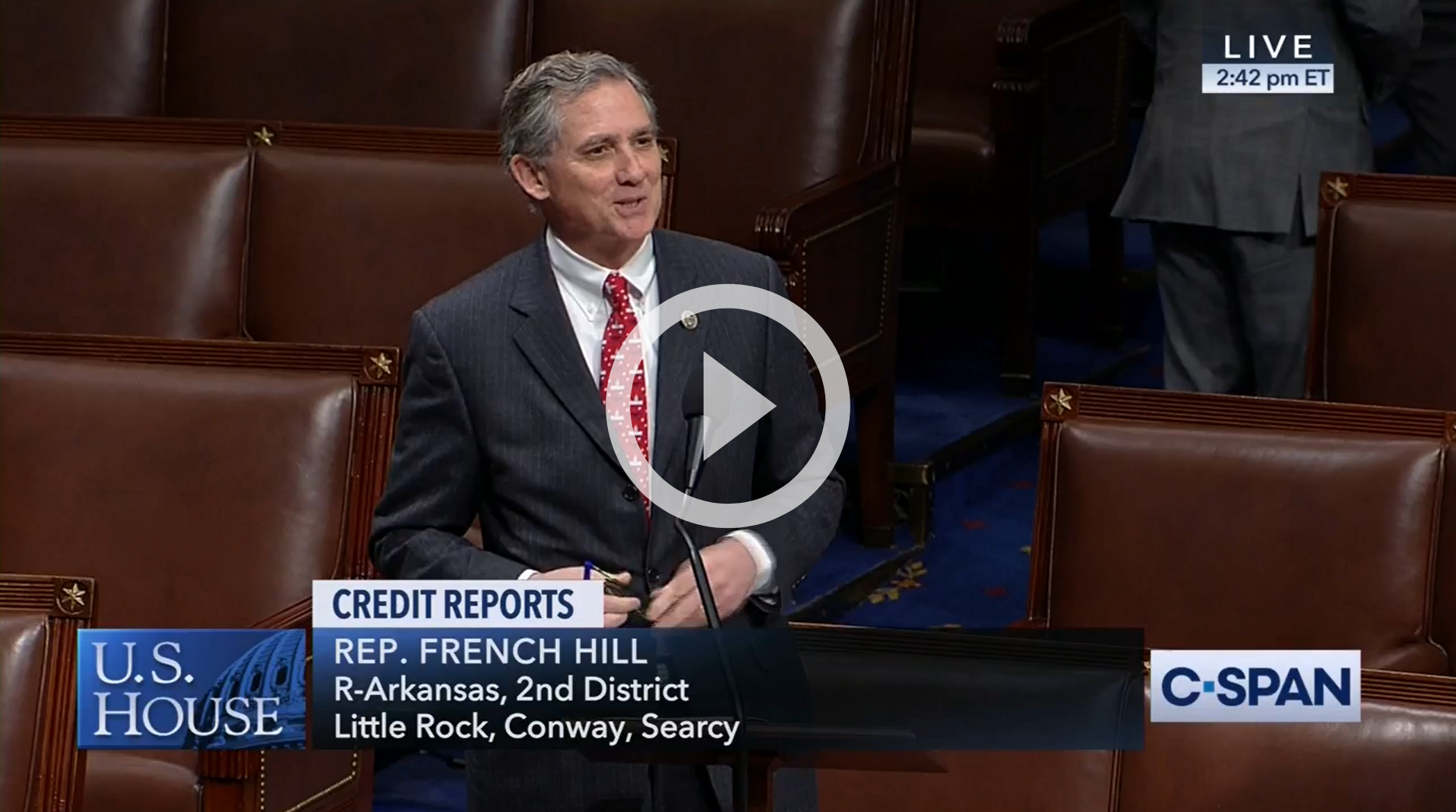ICYMI: Rep. Hill Pushes For Bipartisan Legislation During Amendment Debate
Washington,
January 31, 2020
WASHINGTON D.C. — Members of the U.S. House Committee on Financial Services held an amendment debate in the House for H.R. 3621, the Student Borrower Credit Improvement Act. At the debate, Rep. French Hill (AR-02) spoke in opposition to Rep. Lacy Clay’s (MO-01) amendment and encouraged his fellow lawmakers to consider his bipartisan legislation, H.R. 4231, the Credit Access and Inclusion Act, instead of H.R.3621. Rep. Hill argued that his bill would help the American people improve their credit by allowing consumers to use additional data such as their rent, utility, and telecom payments to build their scores.
Watch Rep. Hill’s remarks HERE or by clicking on the image below. Transcript of the Floor Debate: Rep. Hill: I thank the speaker. While it doesn’t bring me pleasure to claim the time in opposition to my good friend from Missouri, and he knows how much I appreciate the work he’s done on this matter, the amendment is certainly well intentioned. But as currently drafted, Mr. Speaker, this language does more harm to consumers than good. Let me step back and say that, unrelated to Mr. Clay’s amendment, I introduced H.R. 4231, the Credit Access and Inclusion Act, which expands consumer access to credit by allowing them to use their rent, utility, and telecom payments to help build their credit scores. In other words, this bill will help more people have access to credit with those additional facts. As my friend noted, we’ve heard in our Fintech Task Force, and we’ve heard it in the Financial Services Committee: additional data allows millions more access to the credit they need. This bill, the Credit Access and Inclusion Act, was introduced in the 114th Congress and the 115th Congress by my friend, former Representative Keith Ellison. I joined in the last Congress with him and cosponsored it, and in the 116th I’ve introduced it. So, I find it interesting in the last two Congresses my bill was the appropriate way to handle additional data, but in this Congress it is not. Mr. Speaker, I’d also raise the point that there is a bipartisan Senate companion to my bill introduced by Senators Scott and Manchin. Furthermore, the language I’ve introduced was offered as an amendment to this bill by Rep. Gwen Moore, but was ruled out of order in the Rules Committee. As I’ve outlined, H.R. 4231 has strong bipartisan, bicameral support. I believe Mr. Clay is trying to do something similar with the text he’s offered today. But in my view, his version makes it more difficult to establish a credit history, which is underscored by the lack of bipartisan, bicameral support for his text. As drafted, Mr. Clay’s amendment creates a new barrier because it requires written consumer authorization before furnishing a customer’s payment information to a consumer reporting agency for a lease, for a utility, for a telecom service. And this is a stark contrast for how the current credit system, credit reporting methodology works. This amendment requires consumers to opt in, to have their rent, utility, telecommunication payments included in their credit reports. I believe that is a defective viewpoint. Rep. Clay: I just, just in response, quick response, to my friend from Arkansas. Because some consumer advocates have expressed concern that consumers may be evaluated as higher risk for using alternative data than they would be with no reports at all. We worked on this language to try to find the sweet spot. Rep. Hill: Let me thank, Mr. Clay, for his work on this. Requiring an opt in and excluding data that would not allow lenders to get a full picture of consumers financial health, in my view, makes it more difficult for consumers to access credit because practically no rental, utility, or telecommunications company would actually furnish the expanded access program. And therein lies the conundrum here. Therein lies the challenge with Mr. Clay’s approach compared to my approach. But it doesn't stop me from thanking my friend for his work on this. I know it is an area that we share our interest in. I know that this area keenly is important to him. … This amendment as it's currently drafted, I cannot support it. I urge my colleagues to vote no, but I hope my colleague would be open to working together to find a better solution that truly benefits consumers, expands additional data, allows people to offer these products because it will qualify more credit needy Americans for credit, badly needed credit…. I think we ought to work within the system and make it better. That’s why I support my measure I’ve introduced in the House and oppose this amendment. And with that, I yield back the balance of my time. |


